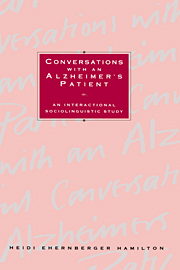4 - Responses
Published online by Cambridge University Press: 27 March 2010
Summary
Just as every question anticipates a response, a discussion of questions without an examination of the responses to those questions would seem to dangle in midair. This examination of responses is divided into two major sections: the first on the appropriateness of Elsie's responses and the second on response as a discourse strategy.
Following a discussion of the criteria I developed to determine the appropriateness of a response in conversation, I present the results of the analysis of Elsie's responses to my questions in five selected conversations. Based on these results, I trace the qualitative changes which characterize Elsie's responses over time. In the first two conversations Elsie's inappropriateness consists primarily of vague and grammatically mismatched responses. In the third conversation, however, question type mismatches (such as yes responses to wh-questions) and “no responses” join the first two types of inappropriate responses in almost equal representation. In the final two conversations, Elsie's inappropriateness consists overwhelmingly in not responding to the question.
A longitudinal examination of Elsie's proportion of appropriate responses indicates no clear downward trend to accompany the progression of Alzheimer's disease. The proportion of her appropriate responses in the fourth and fifth conversations is actually higher than in the first and third conversations. The explanation of this unexpected result seems to lie in my own linguistic behavior. Analyses point to the fact that I am (unintentionally) accommodating to Elsie's changing ability to respond to various types of questions, thus enabling Elsie to continue to be a successful partner despite increasing difficulties.
- Type
- Chapter
- Information
- Conversations with an Alzheimer's PatientAn Interactional Sociolinguistic Study, pp. 108 - 147Publisher: Cambridge University PressPrint publication year: 1994



